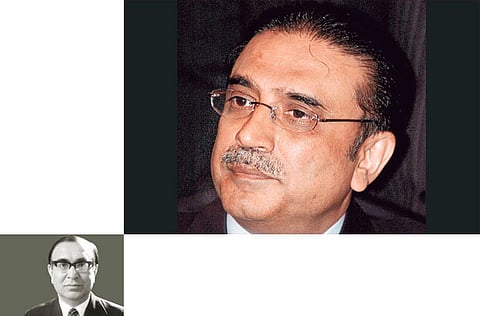A thaw without promise of spring
Claims of qualitative shift in Pakistan-US ties is wishful thinking

On July 3, a day before the American Independence Day, the Government of Pakistan moved courageously to reverse the decline in Pakistan-US relations, by ending the suspension of transit facilities to Nato-Isaf forces in Afghanistan. The episode of non-cooperation was almost unprecedented in six decades of the relationship. Islamabad took this decision, of ending this suspension of transit facilities, that will be vital to the US and its allies during the remaining period of active combat and, subsequently, beyond it when America projects power in the region through selected strongholds on Afghan soil at a politically difficult time. Public opinion in Pakistan is more alienated from the US than ever before. A recent PEW Research poll concluded that 74 per cent Pakistanis identified the US as an unfriendly power. The same poll put the popularity rating of President Asif Ali Zardari, the real pillar of Pakistan’s pro-US policy, at a mere 14 per cent.
During the last seven months, Pakistan’s unusual defiance has been attributed to the compulsion to respond to a Nato air attack on a Pakistani frontier check post in Salala, in which 24 Pakistani soldiers were killed. It is true that without this ghastly incident, Pakistan would not have retaliated so precipitately. The Salala incident became qualitatively different on two counts. One, it spread the popular outrage to the armed forces that have suffered substantial casualties during various phases of the so-called war on terror Two, it was seen as a climactic moment in the tussle between the two allies — the US and Pakistan — over right policy after a virtually failed decade-old military campaign in Afghanistan. The Pakistani civil and military authorities have found it increasingly difficult to fudge the fact that this campaign had, for all practical purposes, developed an undeclared spur into Pakistan — that America is indeed waging a limited war inside Pakistan. Inaction in the face of the massacre at Salala was no longer an option.
There is much criticism in Pakistan that it has now simply buckled under multi-dimensional pressures, backed by ominous hints of grave anti-Pakistan moves through Congress and the international financial institutions. The fact of the matter is that Pakistan was never able to put together a game plan that would achieve the larger objectives underlying the denial of Nato routes for nearly seven months. Several internal fault lines, including frequent dissonance between the politicians in power and the military, detracted Pakistan from coherence and authenticity in its policy on America.
The best that the government came up with was parliament’s declaration to revisit the entire Pakistan-US relationship with a view to asserting greater national sovereignty. Parliament did come up with a reasonable plan, but Washington frustrated the expectation of fundamental negotiations and opted for tough tactics. It ruled out an outright apology for the Salala deaths, cessation of drone attacks and acceptance of an enhanced tariff for Nato transit sought at one stage by Pakistan to offset the massive degradation of Pakistani infra-structure during a whole decade of excessive Nato use.
Pakistan’s Foreign Minister, Hina Rabbani Khar, has defended the inevitable decisions of July 3 by claiming a new beginning in Pakistan-US relations. The decisions are justifiable in as much as the opposite was no longer sustainable, but her claims about a qualitative shift in bilateral relations contain much wishful thinking. The two sides are still wide apart, both at the strategic and tactical level.
At the strategic level, there is still no shared blue print for the end game in Afghanistan. Secondly, there are apprehensions in Pakistan that America is shifting gear on India-Pakistan relations. The Pakistani establishment — civil and military — has now embraced the idea of a broad rapprochement with India as never before. Washington has traditionally supported it, but there are fears that in its present effort to mount pressure on Pakistan, it may be using its influence on New Delhi to slow down the peace process.
At the tactical level, drone attacks that have moved to centre stage during Barack Obama’s presidency, would continue to bedevil relations. The official response to the hugely unpopular CIA drone attacks on targets within Pakistan has always been subdued and ineffectual. The public outrage has kept growing and works against the government’s standing with the people.
After demanding a transit fee as high $5,000 (Dh18,390) per container, Pakistan has waived all charges to demonstrate solidarity with the cause in Afghanistan. Instead, there is probably a promise by Washington that it would now go ahead with the reimbursement of more than a billion dollars as Coalition Support Fund, already spent by Pakistan on the war on terror. Payments were frozen as reprisals for the denial of Nato routes.
July 3 marks an important date in restoring a transactional relationship, but it would be an exaggeration to claim that it is the rebirth of a genuine strategic partnership between Islamabad and Washington. In fact, fear of a breakdown in Afghanistan during US-Nato withdrawals without a basic peace agreement may strain relations again unless the two sides can rise to imaginative diplomacy that has mostly been absent.
Tanvir Ahmad Khan is a former foreign secretary of Pakistan who has also served as ambassador to several countries.


